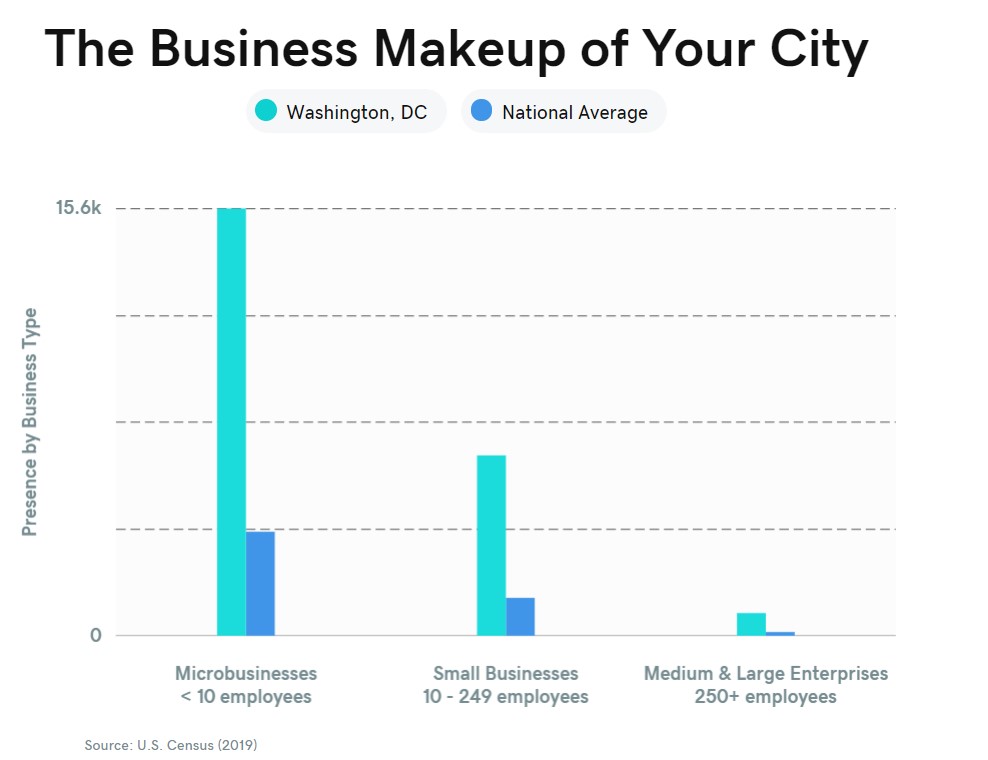While the 2010s might have been one of the least entrepreneurial periods in US history, with booming venture capital and a wealth of new founders, no one can deny that startups have a big role to play in post-pandemic DC.
But an unsung hero on the scene, according to a new study from Venture Forward by domain host GoDaddy, is the area’s growth in microbusinesses. The smaller sibling of a startup, a microbusiness, as defined in this study, is a company with under 10 employees and an active website. The majority, around 57%, are established by solo founders, and about two-thirds look to the business as their main or supplementary source of income.
With this definition, microbusinesses frequently tend to rely on the internet for things like sales on Instagram or using a website to book hair and nail appointments. Thus, the internet, Venture Forward Senior Director Alexandra Rosen said, is a crucial part of the success of these businesses.
“While it’s important to have access to internet, it’s how you use it that’s even more important,” Rosen said, noting that once founders receive access to broadband, they’re in need of assistance with marketing to really be successful.
Here are some of the main findings of the study, nationally:
- 17% of all microbusinesses were started in the last 16 months
- Black-owned businesses made up 26% of this number and women-owned businesses accounted for 57%, which is actually an increase from pre-pandemic.
- 24% of microbusinesses are owned by those who’d otherwise be classified as out of the workforce (homemakers, students or those that were laid off).
- 64% of survey respondents started their business with an initial investment of less than $5,000, higher than the 48% who said the same in 2020.
At home, microbusinesses in DC are actually more plentiful than the national average, numbering around 15,600 in the District. That’s a 148% increase from pre-pandemic, meaning when they have extra time, Washingtonians apparently launch small businesses.
According to Venture Forward, this boom is in the area’s favor. The microbusinesses, which require such small costs to get started, increased so much in 2020 as founders used public funding like stimulus checks to launch. With this additional access, bypassing systematic prejudices in lending that BIPOC founders often experience, microbusiness founders brought more income into their communities with their businesses.
“When looking over a number of years, if you add one to a community, the median household income goes up,” Rosen said.
They also help with employment, Rosen said, despite their small size. She said that for every microbusiness added, at least two jobs will be added per entrepreneur. In areas that had increased broadband access (a must that many communities are still missing), unemployment would go down across the board.
According to Rosen, microbusinesses can already be called Baltimore’s hidden talent, and it’s not unlikely that they can have the same impact in DC.
“They’re tiny, but what they do is they’re the long tail that really adds up in terms of their contributions to the local economics performance and ecosystem,” Rosen said.

Despite their strong growth in the past 18 months, microbusinesses still need assistance to really continue this trend and bloom into all they can be. Rosen said that respondents to the survey noted a need for marketing support and mentorship in businesses. Black and women entrepreneurs, she noted, are also seeking increased knowledge of or access to the government programs in their area.
“What they really say they need capital for is help managing their website,” Rosen said. “The challenges we’ll see here, it’s marketing across the board. And then the places where [respondents] say capital, we ask them what would you use that capital for? And it comes back to marketing.”
While microbusinesses usually stay at this under-10-employee size, it’s likely that this boom could help the District’s startup community overall. Rosen noted that there’s representation in microbusinesses from both part-time founders and those making it a full-time career, meaning it’s a broad spectrum of eager founders.
Like startup ecosystems, as this booming amount of microbusinesses age, there’s potential for founders to move into a second business, as well. About 17% were started in the last year and a half, but Rosen noted that number indicates that eight out of 10 businesses were started before 2020, meaning that founders are creating multi-year, successful businesses. Knowing that the average entrepreneur has more than one business, Rosen said that as these founders gain momentum, it’s very likely that they’ll start second or even third businesses going forward.
While they might not be the ones creating drastic change to industries, microbusinesses definitely shouldn’t be ignored going forward, Rosen noted.
“Not everybody wants to disrupt an industry, but these people really are passionate about what they do and they can work on it full-time, make money,” Rosen said. “Then all they need is a little help with some capital and some marketing.”
Read the full report






